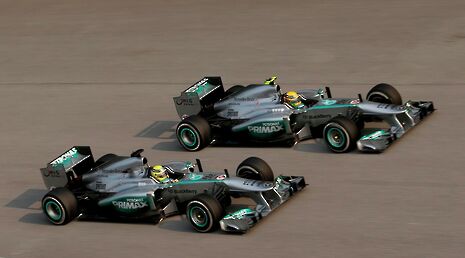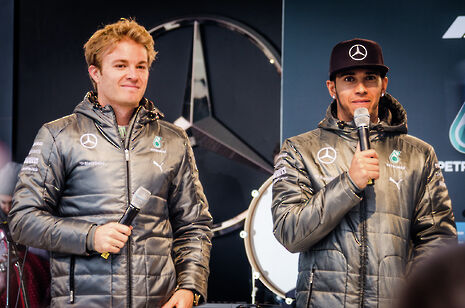Hamilton vs Rosberg: The great versus the good?
With this year’s F1 season set to conclude with another Mercedes showdown, Charlie Stone examines whether Nico vs Lewis is a true racing rivalry

All of a sudden, Nico Rosberg’s ahead. Lewis Hamilton, 43 points behind after five races of this year’s Formula 1 World Championship, and then 19 ahead after 13 races, was widely expected to go on to dominate yet another F1 season. Instead, Rosberg’s win in Singapore, his third in a row, has provided another twist in a topsy-turvy championship fight that has promised so much to both of these drivers.
This is one of the most exciting rivalries in recent F1 memory. Mercedes’s dominance over the constructors’ championship has ensured that the other drivers are only a backdrop to the struggles, spats, and controversies that take place between Hamilton and Rosberg: two drivers, in their prime, fighting to be the best. The excitement that is seen every race weekend – something that F1 has been perhaps lacking in past years – prompts the question: are we witnessing one of the great racing rivalries?
In short, we are not. There is no doubt that Hamilton can – and will – go on to be one of the legendary F1 drivers: his exciting, risk-taking style of driving has already won him three world championships and he has shown no sign of relenting yet. His big personality, whether he be crowd-surfing in Silverstone or celebrating wildly over the team radio, never fails to entertain. And Nico provides a worthy opponent.
But that is just it: he is only a worthy opponent. The Mercedes story is really the Hamilton story, for Rosberg has not had a say late in the championship until, perhaps, now. In 2014, Hamilton did make up a 25-point gap to Rosberg three times but still went on to win the championship by a significant margin. In 2015, he won easily – most of Rosberg’s wins came after the championship was as good as decided.
Admittedly, there is a difference this year – Hamilton is not on top – but it is nonetheless hard to see Nico as a great in his own right. Where Hamilton is exhilarating, Rosberg is mechanical. Where Hamilton is unlucky, Rosberg is lucky. In fact, many people still tend to put down the tightness of the championship to two things: the utter dominance of Mercedes over the other constructors, and Hamilton’s terrible luck early on in the season.
This is perhaps slightly unfair on Rosberg, yet it is hard to argue that the 43-point lead he accumulated early on this season was entirely down to his own skill: Hamilton’s car was extremely unreliable – so much so that he questioned his own team’s loyalties – and the fact that the Brit has achieved a 62-point swing so quickly puts Rosberg’s fighting qualities into doubt. Perhaps these doubts have been erased by Rosberg’s success since the summer break – with three wins out of three, he is in the proverbial driving seat – but there still persists the feeling that this is again Hamilton’s year. The gulf between the two drivers seems to run far deeper than just on the leaderboard.
In the past, it was clear that the classic F1 rivalries were between two truly great drivers. The 1970s were dominated by Niki Lauda and James Hunt: two men whose personalities were so different – Hunt, an outlandish Englishman with a playboy attitude, the like of which had never before been seen in F1, while Lauda was an efficient, ruthless driver, completely dedicated to his job. Their tussles were so exciting that they inspired a major Hollywood film, Ron Howard’s Rush, and numerous documentaries. In 1976 for example, Hunt won the championship by a single point against Lauda, who had almost died in a horrific accident at the Nürburgring and had led by more than 30 points until Hunt pipped him in the final race.

Later on, especially in 1989 and 1990, it was Ayrton Senna versus Alain Prost. Their relationship was tumultuous and their collisions shocking, and they brought probably the most famous moment in F1 history: at the Japanese Grand Prix of the 1990 season, both flew together into the gravel at Turn 1 to ensure that Senna became champion.
Importantly, in those days, success was down to driving rather than the cars. Lauda put the atmosphere of his racing days best when he said: “It’s different today, but then it was a tougher time. Every race we went out and survived, we celebrated, had a party. It was a different time.” Indeed, it was a dangerous time, where drivers would risk their lives whenever they went out onto the track: a time where Senna would tragically lose his.
So when these fierce rivalries are examined in the light of today’s, Hamilton and Rosberg does not quite seem to compare. It is thrilling, of course, but it is hard to escape the feeling that Rosberg is only a good driver in a great car. He gave this away a bit, too: when told in Belgium that Hamilton had come from the back of the grid to finish third, Rosberg was simply awestruck, publically asking: “How did he do that?” Indeed, even though the German is ahead of Hamilton, he still seems to be in his teammate’s shadow.
However, with all this said, things can still change. Sunday is the day of the Malaysian Grand Prix, and a good result for Rosberg will see him move further ahead of Hamilton in the championship standings. This season now represents a great chance for Rosberg: with a takeover of F1 seemingly imminent, the winner of this year’s Driver’s Championship will be the last of the Ecclestone era before the reign of the new F1 chairman, Chase Carey, begins. If Hamilton wins, Rosberg could be forgotten, their rivalry could be dismissed and Hamilton will be the name on everyone’s lips. But if Rosberg becomes champion, all that could be different.
This can still become a great rivalry, but Rosberg’s time is running out. Bring on Malaysia.
 News / Police to stop searching for stolen Fitzwilliam jade17 April 2024
News / Police to stop searching for stolen Fitzwilliam jade17 April 2024 Interviews / ‘It fills you with a sense of awe’: the year abroad experience17 April 2024
Interviews / ‘It fills you with a sense of awe’: the year abroad experience17 April 2024 News / Night Climbers call for Cambridge to cut ties with Israel in new stunt15 April 2024
News / Night Climbers call for Cambridge to cut ties with Israel in new stunt15 April 2024 Sport / Kabaddi: the ancient sport which has finally arrived in Cambridge17 April 2024
Sport / Kabaddi: the ancient sport which has finally arrived in Cambridge17 April 2024 Features / Cambridge’s first Foundation Year students: where are they now?7 April 2024
Features / Cambridge’s first Foundation Year students: where are they now?7 April 2024





